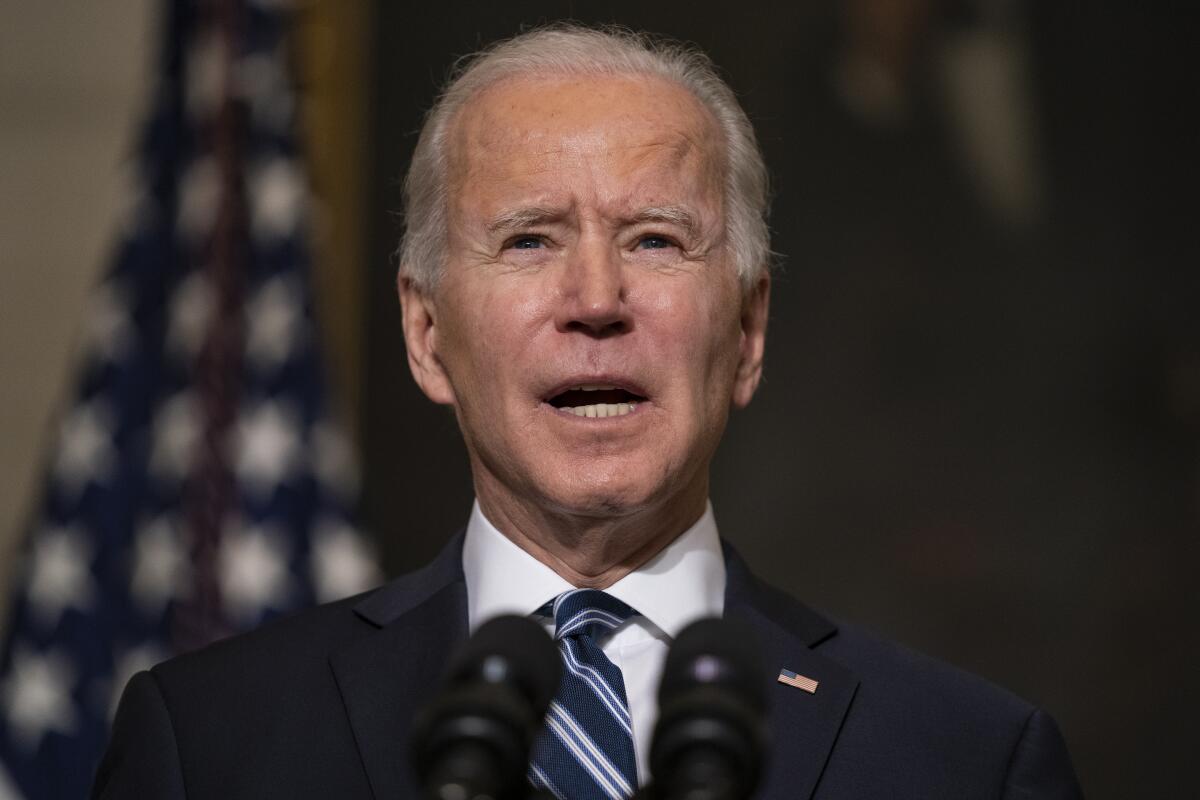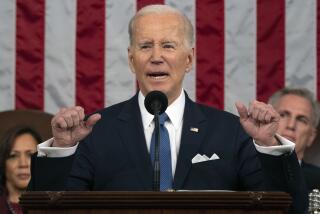Biden to meet with Republicans proposing $618-billion coronavirus aid

- Share via
WASHINGTON — President Biden is set to meet on Monday with a group of 10 Republican senators who have proposed $618 billion in coronavirus relief, about a third of the $1.9 trillion he is seeking as congressional Democrats are poised to move ahead without Republican support.
The Republicans propose slimmer benefits, including $1,000 in direct payments to individuals earning up to $40,000 a year, or $80,000 for couples, according to a draft obtained by the Associated Press. The proposal would begin to phase out the benefit after that, with no payments for those individuals earning more than $50,000, or $100,000 for couples. That’s less than Biden’s proposal for $1,400 direct payments at higher income levels.
The cornerstone of the GOP plan appears to be $160 billion for the healthcare response — vaccine distribution, a “massive expansion” of testing, protective gear and funds for rural hospitals, according to the draft.
Other elements of the package are similar but at far lesser amounts, with $20 billion to reopen schools and $40 billion for Paycheck Protection Program business aid.
An invitation to the GOP senators to meet at the White House came hours after the lawmakers sent Biden a letter Sunday urging him to negotiate rather than try to ram through his relief package solely on Democratic votes. The House and Senate are on track to vote as soon as this week on a budget resolution, which would lay the groundwork for passing an aid package under rules requiring only a simple majority vote in the closely divided Senate.
The goal is for passage by March, when extra unemployment assistance and other pandemic aid expires. The meeting to be hosted by Biden would amount to the most public involvement for the president in the negotiations for the next round of coronavirus relief. Democratic and Republican lawmakers are far apart in their proposals for assistance.
Democrats are rejecting a Republican pitch to split President Biden’s $1.9-trillion COVID-19 rescue plan into smaller chunks.
White House Press Secretary Jen Psaki said Sunday that Biden had spoken with the leader of the group, Sen. Susan Collins (R-Maine). Though Biden wants “a full exchange of views,” Psaki reiterated that the president remains in favor of moving forward with a far-reaching relief package.
“With the virus posing a grave threat to the country, and economic conditions grim for so many, the need for action is urgent, and the scale of what must be done is large,” Psaki said.
In challenging Biden to fulfill his pledge of unity, the group said in its letter that its counterproposal will include $160 billion for vaccines, testing, treatment and personal protective equipment and call for more targeted relief than Biden’s plan to issue $1,400 stimulus checks for most Americans.
Winning the support of 10 Republicans would be significant for Biden in the 50-50 Senate where Vice President Kamala Harris is the tie-breaker. If all Democrats were to back an eventual compromise bill, the legislation would reach the 60-vote threshold necessary to overcome potential blocking efforts and pass under regular Senate procedures.
“In the spirit of bipartisanship and unity, we have developed a COVID-19 relief framework that builds on prior COVID assistance laws, all of which passed with bipartisan support,” the Republican senators wrote. “Our proposal reflects many of your stated priorities, and with your support, we believe that this plan could be approved quickly by Congress with bipartisan support.”
The plea for Biden to give bipartisan negotiations more time comes as the president has shown signs of impatience as the more liberal wing of his party considers passing the relief package through a process known as budget reconciliation. That would allow the bill to advance with only the backing of his Democratic majority.
The Republicans did not provide many details of their proposal. One of the signatories, Louisiana Sen. Bill Cassidy, said that it would cost about $600 billion.
“If you can’t find bipartisan compromise on COVID-19, I don’t know where you can find it,” said Ohio Sen. Rob Portman, who also signed the letter.
But even as Biden extended the invitation to the Republican lawmakers, Psaki said that $1,400 relief checks, substantial funding for reopening schools, aid to small businesses and hurting families, and more “is badly needed.”
“As leading economists have said, the danger now is not in doing too much: It is in doing too little,” Psaki said. “Americans of both parties are looking to their leaders to meet the moment.”
Get our L.A. Times Politics newsletter
The latest news, analysis and insights from our politics team.
You may occasionally receive promotional content from the Los Angeles Times.
Biden also spoke Sunday with House Speaker Nancy Pelosi (D-San Francisco) and Senate Majority Leader Charles E. Schumer (D-N.Y.), who are facing a growing push from the more liberal Democratic members to move forward with Biden’s legislation with or without Republican support.
The other GOP senators invited to meet with Biden are Lisa Murkowski of Alaska, Mitt Romney of Utah, Shelley Moore Capito of West Virginia, Todd Young of Indiana, Jerry Moran of Kansas, Mike Rounds of South Dakota, and Thom Tillis of North Carolina.
Brian Deese, the top White House economic advisor leading the administration’s outreach to Congress, indicated the White House could be open to negotiating on further limiting who would receive stimulus checks. Portman suggested the checks should go to individuals who make no more than $50,000 per year and families capped at $100,000 per year.
Under the Biden plan, families with incomes up to $300,000 could receive some stimulus money.
“That is certainly a place that we’re willing to sit down and think about, are there ways to make the entire package more effective?” Deese said.
As a candidate, Biden predicted his decades in the Senate and his eight years as Barack Obama’s vice president gave him credibility as a deal-maker and would help him bring Republicans and Democrats to consensus on the most important matters facing the country.
But less than two weeks into his presidency, Biden showed frustration with the pace of negotiations at a time when the economy exhibited further evidence of wear from the pandemic. Last week, 847,000 Americans applied for unemployment benefits, a sign that layoffs remain high as the COVID-19 pandemic continues to rage.
“I support passing COVID relief with support from Republicans if we can get it. But the COVID relief has to pass — no ifs, ands or buts,” Biden said Friday.
In the letter, the Republican lawmakers reminded Biden that in his inaugural address, he proclaimed that the challenges facing the nation require “the most elusive of things in a democracy: Unity.”
Cassidy separately criticized the current Biden plan as “chock-full of handouts and payoffs to Democratic constituency groups.”
“You want the patina of bipartisanship ... so that’s not unity,” Cassidy said.
Jared Bernstein, a member of the White House Council of Economic Advisers, said officials needed to see more details from Republicans. Doing too little to stimulate the economy could have enormous impact on the economy in the near- and long-term, he said.
“Look, the American people really couldn’t care less about budget process, whether it’s regular order, bipartisanship, whether it’s filibuster, whether it’s reconciliation,” Bernstein said. “They need relief, and they need it now.”
More to Read
Get the L.A. Times Politics newsletter
Deeply reported insights into legislation, politics and policy from Sacramento, Washington and beyond. In your inbox three times per week.
You may occasionally receive promotional content from the Los Angeles Times.











